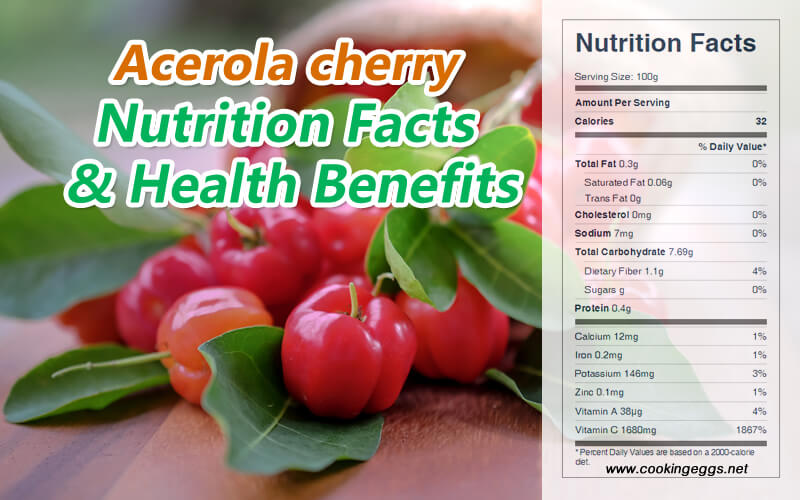Acerola Cherry Nutrition Facts & Health Benefits
Warning: A non-numeric value encountered in /www/wwwroot/www.cookingeggs.net/wp-content/plugins/nutrition-facts-label/nutrition-facts-label.php on line 384
Acerola is native to South America and is also called acerola cherry, West Indian cherry, Guarani cherry, and Barbados cherry. Acerola fruits are round or oval cherry-like fruits; the skin turns bright red when they mature. The fruit can be used to make juices, pulps, and vitamin C concentrates.
Nutritional Value of Acerola Cherry Fruit
Acerola fruit is 91% water, 8% carbohydrates, and contains negligible protein and fat. It provides an exceptional supply of vitamin C; it also supplies manganese, iron, calcium, and phosphorus.
In a 100-gram reference amount, raw acerola fruit contains 32 calories, 7.69 g carbohydrate, 0.4 g protein, 0.3 g fat, 1.1 g dietary fiber, 767 IU vitamin A, 1680 mg vitamin C, 18 mg magnesium, 7 mg sodium, 11 mg phosphorus, 12 mg calcium, 0.2 mg iron, 146 mg potassium, and 0.1 mg zinc.
The acerola cherry is rich in vitamin C, pectin and pectolytic enzymes, carotenoids and fibre, and contains small amounts of vitamins and several bioactive substances, such as thiamin, riboflavin, niacin, proteins and mineral salts. The carotenoid composition of acerola fruits includes neoxanthin, violaxanthin, lutein, β-cryptoxanthin, α-carotene and β-carotene.

Raw Acerola Nutrition Facts Label
Health Benefits of Acerola
Acerola cherries are high in vitamin C. This fruit is recognized as the best natural source of vitamin C. In comparison with synthetic ascorbic acid, the vitamin C produced by this fruit is better absorbed by the human body. In fact, humans can only absorb 50% of synthetic vitamin intake compared to that of natural vitamins. The high vitamin C content of acerola fruits enables them to be used for the production of vitamin C concentrate for pharmaceutical purposes or for enrichment of industrialized foods. Vitamin C plays a key role in the biosynthesis of collagen, carnitine, neurotransmitters, corticoids, and catecholamines as well as in the synthesis and maintenance of tissues, including the formation of bones, teeth, and muscles.
Acerola can be a potential useful source for pectin, a macromolecule currently used in the candy industry and in foods as a dietary fibre. Pectin is a soluble dietary fiber. It has been shown to reduce blood LDL cholesterol levels. The mechanism appears to be an increase in viscosity in the intestinal tract, leading to a reduced absorption of cholesterol from bile or food. In the large intestine and colon, microorganisms degrade pectin and liberate short-chain fatty acids that have a positive influence on health (prebiotic effect).
Acerola is a remarkable functional food resource. There are three polyphenols in acerola fruits: cyanidin, pelargonidin, and quercetin. These polyphenols have an antiperglycemic effect, with the mechanism thought to be both the suppression of intestinal glucose transport and the inhibition of α-glucosidase, and are thus beneficial to human health. The high antioxidant content of acerola extracts has contributed to their use for the prevention of age-related diseases such as hypertension and cancer.
The research shows that the ORAC (oxygen radical absorbance capacity) value of acerola is higher than that of strawberries and blackberries. In addition, the acerola cherry extract can prevent the oxidation of low-density lipoproteins, thus reducing an important risk factor in coronary heart disease, an extremely beneficial outcome for the health of postmenopausal women.
In addition to vitamin C and E, acerola cherry is a good source of vitamin A(beta-carotene). Plant carotenoids are the primary dietary source of provitamin A worldwide, with β-carotene as the best-known provitamin A carotenoid. The study showed that these compounds possess antioxidant properties. They are essential for embryo development and growth and for the maintenance of the immune system. Together with vitamin A, they work to protect the retina.
Acerola is high in manganese, which is also an essential human dietary element. Manganese is present as a coenzyme in several biological processes, which include macronutrient metabolism, bone formation, and free radical defense systems. It is a critical component in dozens of proteins and enzymes.